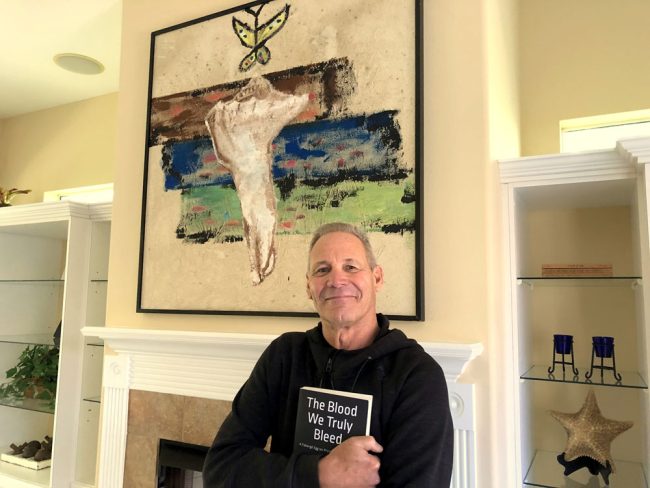
When retired Flagler County Schools librarian Monica Campana read “The Blood We Truly Bleed: A Fabergé Egg on Princess Place Island,” she had some questions for the novel’s writer: “Wow, what kind of anger are you harboring? What kind of violent tendency are you scheming up? Children are murdered in this book! Are you OK?”
“That’s a big question that everybody asks me,” says the author, Caesar Campana, as his sardonic laugh matches that of his wife, Monica, who quickly adds, “I know you’re OK.”
Caesar says readers, especially his relatives, especially Monica and their four adult children, are prone to “start wondering, ‘Hey, what’s going on in your head?’ ”
Palm Coast-area residents may be wondering that, too, about their neighbor, especially when they realize this Caesar Campana is the Coach Campana who led Flagler-Palm Coast High School’s football team for 10 years during two tenures from 2003 to 2014 (with a one-year hiatus to lead an alternative school for drop-out prevention at Princess Place Preserve in Flagler County; he was an assistant coach under Steve Allen until 2009, when he became head coach).
Never mind that Campana also served as an English teacher throughout much of his high school coaching career at FPC and at Orlando high schools in the 1980s and ’90s. Never mind that, growing up in Woodbury, N.J., in a family with Italian heritage, Campana was constantly fed books by his bartender father, a bibliophile who had the audacity to name his son Caesar III (the family line now extends to Caesar V).
Never mind that when Caesar and Monica met and began dating in high school in Jersey, Monica says, “We would sit and talk about books at JV basketball games.”
Despite his inherited bibliophilia, people who know Campana as a football coach have been surprised to discover that, since he retired in 2016, concluding his education career as an English teacher, Campana has found a new role – fiction writer.
Coach Campana fans would be even more surprised to discover the kind of stuff that flows from his mind onto his laptop during his daily writing sessions at the couple’s home in the Hammock in Flagler County: fanciful historical fiction laced with mysticism and violence, the tale of a gay quarterback at a Bible Belt university, romans à clefs, of a sort – “embellished recreations,” Campana calls them – drawn from his four decades as a coach and teacher since graduating with a BA in education from North Carolina State in 1976, where he played (well, seldom played, he cheerfully admits) as a third-string quarterback under Coach Lou Holtz. Campana has even published –egads! – some poetry.
Campana’s verbal descriptions of his writings, and the blurbs on his self-published books, which are all available on Amazon, often deploy the “D” word – dark.
“The Blood We Truly Bleed,” his new novel and fifth book, is a work of historical fiction laced with magical realism and mysticism – a tale of Tony Lazio, a modern-day American Baby Boomer, and Stefan Lukavyy, a Russian immigrant. Both protagonists, though living 100 years apart, lead parallel lives. The two “flawed heroes,” the back cover blurb says, “travel a dark path mapped with violence, murder and accidental executions that involve Russia’s Imperial family, Henry Flagler, Shaquille O’Neal, Mickey Mouse and two stolen Fabergé Eggs.” Not to mention the Princess Place connection.
Dreams, Haitian voodoo and a strange kinship between wolves and alligators also figure into the tale, as does a female antagonist Campana describes as “Lady Macbeth — another Russian immigrant who’s violent, ruthless and will do anything to get anything done.”
With “Blood,” Campana says, he learned to use symbolism, then he notes: “You’re going to see wolves and gators throughout my book, which I think are brothers, they’re related somehow.” The impish twinkle in his eyes makes one wonder if the wolf-gator connection is a phantasmic literary device, or something the novelist himself believes.
“This whole thing of going into the mystical type of thought started in my first book,” Campana says, referencing his 2017 novel “Coach Sal Grasso and Cape Fear U: An Outrageous Story About Football and the South.” “At one point Sal Grasso, amid all this craziness of the way his world is going, goes swimming at midnight.” (Astute literature fans will notice echoes of the late-night swim that Dr. Bernard Rieux and Jean Tarrou take in the Mediterranean Sea in Albert Camus’s “The Plague.”)
Lest one assume Campana swims too deeply into the mystical, he quickly adds: “I’m a humanist. This is it guys. Take care of it. Have fun with it. What did Tony Soprano say? All of a sudden the lights turn out.”
Campana had written short fiction sporadically since his days as a high school student, and even throughout his coaching and teaching career. His “first real story,” he says, “was a short story I wrote in 1990 for my mother, kind of a tribute to my father who had just passed away at the young age of 62. The story was a coming-of-age thing.”
Retired in 2016 — and with his athleticism surprisingly not extending to the retiree’s sport of golf – he found himself with free time. But the real inspiration to write his first novel, he says, came “like a lot of things that I’ve done” — from his competitive athletic nature.
“It was a challenge,” he says.
The seed of that first novel, “Coach Sal Grasso and Cape Fear U,” “kind of popped into my head one day here in the Hammock when I saw an athlete jogging down the road, and I realized that could be a great premise for a story — a gay quarterback in a very conservative, Southern college town,” Campana says.
These days, Campana adds, “I laugh about that first book because it’s wild, crazy stuff,” noting that “it opens with this graphic blow job of this quarterback” (thus ensuring that Jill Woolbright, the book-banning school board member, will now seek to add the book to her inquisition’s pyre). The novel also became part of family lore when son Caesar IV, an English teacher, was recently up for Teacher of the Year in North Carolina.
“We were driving back from the celebration and talking about it’s a shame he didn’t win it,” Campana says. “He said, ‘I often wonder if people are getting me confused with you, the writer of your first book. I’m afraid some of the judges thought that was me, Dad, and so they didn’t want to give the award to me.’ I think he was joking.”
(Campana is quite aware of the strange synchronicity that his gay college quarterback, conceived in 2017, is named Paris Bleu, while “All Boys Aren’t Blue: A Memoir-Manifesto,” that acclaimed 2020 book by journalist and LGBTQIA+ activist George M. Johnson, caused Woolbright in November to seek to ban it from FPC and Matanzas. She succeeded.)
Campana’s other post-retirement works include the short story and poetry collection “Crooked Lines” (2018), the memoir “Smoke in the 200 Hallway: A Teacher’s Stories” (2019), and the novel “A Beautiful Castle of Mud” (2020).
“Smoke in the 200 Hallway” is composed of “embellished recreations” spawned by his teaching days, he says. The Amazon blurb says the work details Campana’s “inspiration to become a teacher as well as his singlehanded attempt to integrate a stubborn high school in the South. We eavesdrop on his conversations with other educators, abused students, delusional parents and a Russian immigrant who outsmarts a guidance counselor. Campana was sucker-punched by an angry student, cursed at by his favorite principal, and inspired to change his lesson plans by a lesbian 9th grader. One of his students came back from the dead.”
“The Blood We Truly Bleed” is a sequel of sorts to Campana’s 2020 novel, “A Beautiful Castle of Mud,” in which a younger Tony Lazio narrates his story: He’s the star quarterback at his New Jersey high school, the son of a brawler bartender father who is tormented rather than comforted by his Catholic faith, and who refuses to ever watch the Olympics again after the “colored runners” raised their fists in protest at the 1968 Mexico City Summer Games. Tony’s atheist mother, of Danish descent, delights in telling him about the dwarves and elves of Norse mythology. She also tells her son that the Catholic Church is “the mafia with priests,” even as she teaches him about the engletje – guardian angels who walk among us.
Tony’s dad forces him to play his last high school game because college recruiters will be watching – even though his mom is dying in the local hospital. Tony confesses he played “like shit,” then he’s off to college at Carolina Tech where he becomes a no-string quarterback on the “shit squad” – the players who simulate the team’s upcoming opponents during practices.
“What I’ve learned in writing is write what you know, but don’t let the truth get in the way of a good story,” Campana says, echoing poet Richard Hugo’s famous dictum from his essay “The Triggering Town”: “All truth must conform to music.”
Still, when Monica catches a glimpse of a twisted, eerily familiar doppelganger that’s “a little something that’s like my life, I think ‘Is that what you wish I was? Who is this creature?’ It’s sometimes painful.”
“People don’t want to read about common, everyday things,” Campana says. “But you can’t on the other hand just go overboard with it. You have to make it explainable, you have to make it logical to a certain extent. Especially when it comes to violence and – the local Flagler writers group I belong to, we were just talking about this a couple weeks ago – sex. You want to put things in there that are enticing for people to read but you don’t want outright pornography. You want people to say ‘That’s kind of a hot scene there,’ but you don’t want plunging organs. It’s like ‘Come on now, that’s disgusting.’
“The same thing goes with violence. Sure, you want to be graphic with it but you don’t want it to be too much.”
Campana’s “write what you know” mantra is fueled by what he’s known since his childhood: sports and literature, along with a streetwise toughness engendered by his first name, which he likens to the tale told by Johnny Cash in his song “A Boy Named Sue.”
“In South New Jersey, in Camden, if your name is Caesar you’re fighting all of the time because people are giving you crap about it,” he says with a chuckle.
As an only son with four sisters, Campana was raised by his bartender father to be a baseball catcher: “In those days Roy Campanella of the Brooklyn Dodgers was like the patron saint of Italians in that part of the country. I was raised to be the next Roy Campanella.”
In high school his “athletic track got a little more serious. Of course my father wanted me to play football. The two main commandments of his life became mine – baseball and football.”
But his bartender dad also was “a prolific reader. He was always dropping Hardy Boys and other books on my shelf and saying ‘Try this one, try this one.’ One of the first books he gave me, which I still have, was ‘Lou Gehrig: A Quiet Hero.’ That got me so excited about that kind of man — his humbleness and his bravery when he figured out he was dying.”
Caesar met Monica in the ninth grade.
“She was captain of the cheerleaders and I was quarterback of the football team,” he says. “It’s a gross story,” he adds with tongue in cheek.
A friend labeled the couple “Ken and Barbie,” Monica says.
“Ken and Barbie,” Caesar says. “People would always say, ‘Are you kidding me?’ We’ve been married for 45 years now.”
In the 10th grade Caesar decided to become an English teacher.
“I was an athlete with all intentions of using that athleticism to eventually promote my career,” he says. At North Carolina State he was an English major in education, and a third-string quarterback. Coach Lou Holtz told Campana he likely would never see much game action, but the fabled coach said he would help his player find a job upon graduation if he stuck it out with the football team.
Caesar and Monica married upon graduation in 1976, and Holtz fulfilled his promise by helping his former bench-warmer and practice-squad player land a job as a teacher and football, basketball and baseball coach at a high school in the Wilmington, N.C., area. When he was an assistant JV football coach at Laney High School, one of his players was a youngster named Michael Jordan – yes, that Michael Jordan.
In summer 1982, the Campanas moved to Orlando, where Caesar taught English and coached football at Orlando Bishop Moore Catholic High School and then Edgewater High School. The couple moved to Palm Coast in 2003, and they maintain a second home in North Carolina.
Just like their banter at those JV basketball games almost a half-century ago, the couple’s conversation these days is peppered with literature talk: references to favorite authors such as Don DeLillo, Pat Conroy, Ernest Hemingway and Richard Brautigan, plus post-mortems on attempted book bans in public schools, fueled by Monica’s three-year tenure on the state committee that selects novels to be placed in the libraries of Florida’s middle schools.
Monica notes she has been a reader since age 5, and Caesar chimes in that she “goes through books like crazy.”
The book talk also turns to the Campana household’s resident novelist.
“Caesar is a fluffy writer,” says Monica – who, it should be noted, is the Campana household’s resident book editor and book critic.
“Well, she’s the best critic,” Caesar says. “My latest thing is no word salads. Monica talks to me about it and says, ‘You said so much to say nothing there.’ And it’s true. I’ll go back and think ‘What in the hell are you trying to say here?’ I’m trying to get better and not do that, and also not be afraid to slash stuff. I have 50 to maybe 80 pages in another Google doc that I deleted from ‘The Blood We Truly Bleed.’ ”
In typical editor fashion, Monica will take a physical copy of Caesar’s writings and slap the red ink of her edits, corrections and suggestions all over it.
“But she gave me the ultimate compliment when she read my last book,” Caesar says. “The last 100 pages didn’t have any marks.”
“I stopped editing because I was reading,” Monica says. “I was totally engaged and I couldn’t edit anymore. I said ‘I will have to go back later and edit.’ I enjoyed it.”
If a novel falls in the woods and no one hears it, does it make a sound?
“That’s a great question,” Caesar says, realizing that it’s a fanciful if not smart-ass way of asking how does one measure the success of one’s writing if not by massive sales and legions of adoring readers – a rarity in the self-publishing world?
“I belong to three writing groups,” Campana says. “They’re fun. They often talk about, and I’ve gone to workshops where they talk about ‘I want to sell my book!’ I often interject at those meetings and say ‘You’ve got to think in terms of why are you writing?’
“Sometimes I try to equate it with swimming. That’s my exercise – I swim. But I have no intention of being in the Olympics. I swim for self-satisfaction, it makes me feel-good, my head’s cleared, it’s a routine that I think is good for me. That’s how I consider writing – it’s a good routine in which I can express myself. It’s a mental exercise.”
But Campana stops and edits himself: “It’s not just a mental exercise as much as a delving into who you are.”
–Rick de Yampert for FlaglerLive
![]()



































David white says
Love you both and miss you all and your mom and dad good to see you all so happy
Steve says
Congrats on Retirement and the publishing of your books.